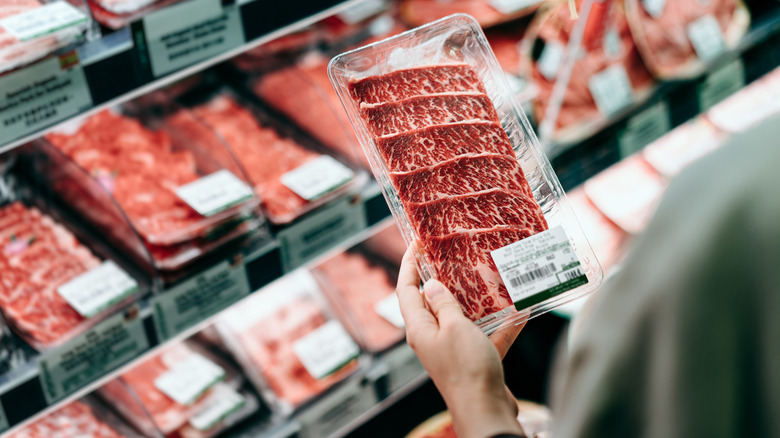Can The Carnivore Diet Give You Scurvy? Our Nutritionist Explains
There's a reason most people are unfamiliar with the medical condition called scurvy. Thanks to improvements in the accessibility of a range of fruits and vegetables, most people aren't at risk of developing scurvy. However, a new lifestyle eating trend called the "carnivore diet" has brought back the threat of scurvy to modern society.
Never heard of scurvy? It's a condition that's caused by a lack of vitamin C. As explained by the Cleveland Clinic, when the body lacks vitamin C, it's unable to effectively keep up with bone and skin development, cell protection, iron absorption, and other core processes. This leaves the body depleted and malnourished.
Unsurprisingly, a few of the initial hallmarks of scurvy include aching joints, exhaustion, and a depressed mood. Without diagnosis and immediate intervention, scurvy leads to more severe symptoms such as loose teeth that sometimes come out, bleeding beneath the skin, and wounds that won't heal.
The recommended treatment to combat scurvy is to ingest vitamin C-rich foods like broccoli and citrus fruits, as well as take extra vitamin C-packed supplements. Within a few weeks of being on a regulated treatment plan, most people who have scurvy will recover. But people who follow the carnivore diet to the letter may have trouble combating scurvy over time because of the diet's restrictive nature.
Prehistoric roots for a modern diet plan
The carnivore diet made its way into popularity via TikTok and has become a topic of intense debate online. The basic gist of the diet is that only meats, eggs, fats, and limited low-lactose dairy products are allowed. This means no fruits, no vegetables, no grains, few fats, and no seeds.
Proponents of the carnivore diet swear that it helps with weight loss, makes weight maintenance simpler, improves depression, and increases energy levels. In one 2021 poll result published in Current Developments in Nutrition, 95% of participants who said they followed the carnivore diet agreed that they were satisfied with their health outcomes. And participants who had diabetes reported seeing an improvement in their condition after becoming carnivore diet followers.
Despite the poll's findings, many nutritionists have warned that eliminating the majority of food groups can have short-term and long-term detrimental effects for carnivore dieters. Among those who caution against jumping into the carnivore diet is Chicago registered dietitian nutritionist Samar Kullab.
Proceed cautiously with the carnivore lifestyle
As Kullab points out, the carnivore diet is ultimately high in fat, low in carbs, and lacks plant nutrients. Though she acknowledges it could help with weight loss due to its extreme carb reduction, she notes that nearly all restrictive diets prompt initial blood marker, appearance, and well-being results. However, their lasting effects are often lacking — and can lead to problems like scurvy.
"The carnivore diet can potentially lead to scurvy because it completely excludes fruits and vegetables," says Kullab. "Fruits and vegetables are the primary sources of vitamin C . . . without adequate amounts of vitamin C the bodies stores eventually become depleted which leads to a disruption of collagen. Collagen is a protein that is essential for the structure and function of connective tissues in the body . . . [w]hich can cause the development of symptoms of scurvy."
Kullab adds that scurvy isn't the only potential condition linked to the carnivore diet. The diet's focus on eating processed meats could contribute to the development of colorectal cancers. "According to the World Health Organization, colon cancer is the third most common cancer," explains Kullab. And though a 2015 study by The American Journal of Clinical Nutrition suggests that upping dietary fiber has been associated with a reduced risk of colorectal cancer, carnivore dieters aren't getting beneficial fiber.
Ways to reduce scurvy odds as a carnivore
This doesn't mean you can't try the carnivore diet. Just keep some tips from Kullab in mind before diving into this diet trend.
First, check in with a healthcare professional, like a physician or registered dietitian. Kullab notes that this is especially important if you have specific medical conditions or nutritional needs. Regular supervision by a healthcare provider will enable you to monitor any possible nutrient deficiencies, such as scurvy-connected low vitamin C levels.
Secondly, stay on top of your water intake, particularly while transitioning into the diet. Because the carnivore diet is high in animal products and low in fiber, Kullab emphasizes the need for constant hydration. Otherwise, you could experience unwanted digestive responses and changes such as constipation, which MedicalNewsToday names as a common gastrointestinal side effect of the carnivore diet.
Finally, embrace those animal organs. They're nutrient-dense, which means you'll be getting a lot of vitamins and minerals. Take liver, for example, which is an organ meat Kullab recommends adding to your meals. One serving of liver provides more than 100% of the recommended daily intake of vitamin B12, vitamin A, riboflavin, and copper in each serving, as noted by Healthline.



